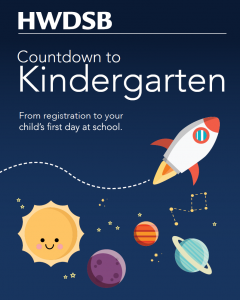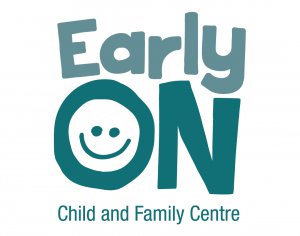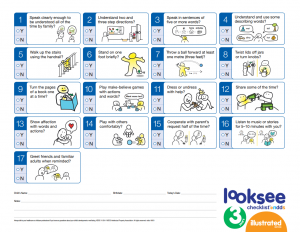
Click here for more information about Kindergarten at HWDSB.
 Families are the most important part of a child’s education. Young children come to school capable, curious and rich in experiences. Important stages of learning and development occur between birth and six years of age in all areas of growth — communication, emotional, intellectual, physical and social.
Families are the most important part of a child’s education. Young children come to school capable, curious and rich in experiences. Important stages of learning and development occur between birth and six years of age in all areas of growth — communication, emotional, intellectual, physical and social.
Children learn at different rates and in different ways! Our team of educators recognizes the unique strengths, interests and needs of children entering our program and adjust teaching methods and materials to support their growth. Here are some ways to help your child prepare for Kindergarten:
- Be responsive and positive – listen to your child
- Talk, read and sing to your child daily
- Encourage clear speech
- Encourage safe exploration and play
- Be selective in the TV shows you watch together
- Encourage independent toileting and dressing
- Promote sharing and co-operation
- Expose your child to painting, crayons and scissors
- Introduce your child to letters and numbers
- Visit your local Hamilton Public Library branch library
- Kindergarten Ready: Tips for parents/caregivers to ease the drop-off
The LookSee Checklist
The Looksee Checklist is a simple, easy-to-use developmental tool designed to help monitor a child’s development from 1 month to 6 years of age, featuring a short list of “yes” or “no” questions about the child’s abilities. With the vision of helping all children reach their developmental potential, the Looksee Checklist (formerly the ndds checklist) was created in 1993 by ndds, a Canadian non-profit organization made up of early childhood specialists. In the 25 years since, it has been translated into over 10 languages and has helped thousands of children worldwide through initiatives with organizations like the Ontario Ministry of Children, Community and Social Services and World Vision.
Early Words
Early Words is a publicly-funded program that provides speech and language services to pre-school children. From the time they are born, children start communicating. Very early in their lives, they learn to understand what you are saying and to make sounds of their own. Communication skills are critical to your child’s future success.
Many parents considering Kindergarten wonder if their child is ready for school. In addition to the Looksee Checklist, HWDSB staff offer the following guidelines for early language. By age four, your child should:
- Follow simple directions with two or three steps (e.g. Get your boots and hat and meet me at the front door)
- Pronounce words like children their age
- Be understood by people they don’t know most of the time
- Speak in sentences that sound about the same as an adult’s
- Use endings on words like dogs, jumped, or biking
- Play a pretend game and describe it to you in enough detail for you to understand
- Ask questions about a book you just read together, like “Who was your favourite character?”
- If your child is unable to do the things listed above, a speech-language pathologist should meet with your child.
Hamilton families can visit the Early Words webpage or call (905) 381-2828 to learn more about the program. Referrals must be made by June 15 of the year of school entry. There is no cost to families.
EarlyON Child and Family Centres
 EarlyON Child and Family Centres provide free opportunities for children from birth to six years of age to participate in play and inquiry-based programs, and support parents and caregivers in their roles. These centres offer safe and welcoming environments open to all families across Ontario, with qualified professionals and quality programs. Families and caregivers can find support, advice, make personal connections and access a network of resources. Click here to find a location near you or call 905.524.4884 for more information.
EarlyON Child and Family Centres provide free opportunities for children from birth to six years of age to participate in play and inquiry-based programs, and support parents and caregivers in their roles. These centres offer safe and welcoming environments open to all families across Ontario, with qualified professionals and quality programs. Families and caregivers can find support, advice, make personal connections and access a network of resources. Click here to find a location near you or call 905.524.4884 for more information.
- EarlyON
- Contact Hamilton – Contact Hamilton is an entry point to services for children and youth with emotional, behavioural or developmental concerns and adults with developmental disabilities.
- Hamilton Public Library
Additional Questions and Answers
Can my child attend Kindergarten part-time?
Kindergarten is not mandatory, and parents can choose to have their child attend Kindergarten on a part-time basis. Schools will explain how part-time attendance would be structured (e.g. half-time mornings/afternoons etc.) Your child can begin full-time attendance when you feel they are ready.
Does my child need to have learned to use the toilet?
All children have a right to attend Kindergarten in the calendar year they turn four years old. Children arrive with diverse abilities and needs, and all are welcome at school. HWDSB staff will work with parents on ways to help children with toileting support, and a school plan that meets each child’s needs and honors their dignity. If a child is not toilet trained by age four, the Canadian Pediatric Society recommends a visit with your family doctor. HWDSB schools have standard sized toilets. Find more information at www.caringforkids.cps.ca/handouts/toilet_learning
What if my child still naps?
Each child is unique and the rate at which they adapt to school will vary. Educators strive for a sense of calm in the classroom and provide large blocks of time to engage children’s attention in sustained, complex play and inquiry. There is no dedicated nap time in Kindergarten. Educators respond to the variety of needs in the class by providing children with a mix of experiences and calm learning opportunities, that fit their energy levels.
How do I report my child's vaccinations to Hamilton Public Health?
Reporting Vaccinations: Parents are responsible for submitting their school-age child’s immunization/vaccine record to Hamilton Public Health. Visit the City of Hamilton website for more information on how to submit the immunization record and/or Hamilton Public Health protocols regarding vaccine exemptions.
Updated on Monday, February 12, 2024.


